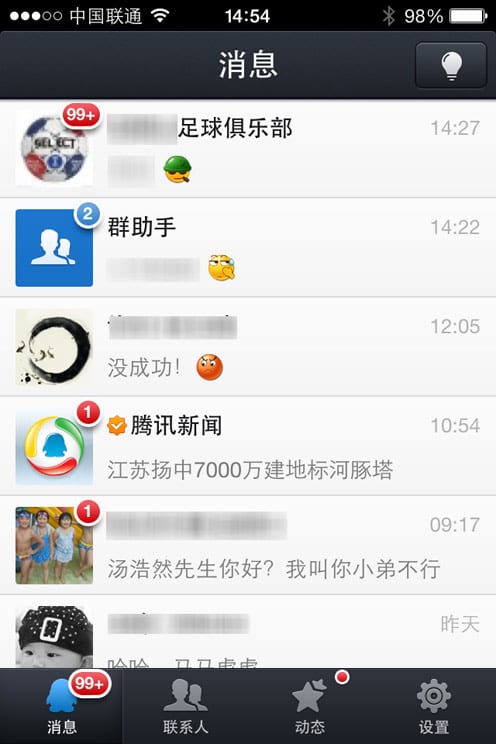Tencent news: in-app news delivery in QQ and WeChat
By Tom McDonald, on 24 October 2013

Newspapers arrive at the town’s Post Office for delivery to local homes and businesses (Photo by Tom McDonald)
One of the aims of our research is to understand the connection between politics and social media. Before we started our fieldwork we had envisaged this topic would largely revolve around how people made posts relating to specific stories in the news or shared news articles on their own Facebook pages. However, once again, China has surprised us in how different its social media is from it’s Western counterparts. People tend to refrain from making lots of public comments about news online, but both QQ and WeChat’s mobile applications (both made by Tencent) are set up by default to deliver national news items to their user’s mobile devices, with these items appearing in-between other conversations users are having with their friends.

The ‘recent conversations’ screen in the QQ iPhone app. The fourth contact down (showing the QQ ‘penguin’ icon surrounded by a tri-coloured circle) is the QQ news centre
The news to each of these in-app news services is written and delivered by the Tencent News centre. Both apps receive three new reports daily, normally containing four stories in each post, and the user receives on-screen notifications when they arrive. Occasionally, especially significant news stories may be afforded their own individual posts.
In general, the news that appears in these stories tends to be middle-brow, and written in quite accessible language, remaining largely free of the formal news about diplomatic meetings and official language that tends to dominate the main closely government-controlled national news sources such as the evening TV News Simulcast (Xinwen Lianbo) and People’s Daily. Instead, Tencent’s in-app news consists mostly of stories focusing on a mixture of criminal cases, ongoing government corruption investigations, sex scandals, and scientific discoveries.
It would be easy to view all Chinese media as a propaganda tool, and an extension of the government, and this is the kind of statement that is often repeated by Western media outlets. However, one of the strengths of the ethnographic approach of our fieldwork is that instead of only analysing the content of social media, we also compare this to how normal people in our fieldsites actually use and talk about these platforms themselves. When I spoke to one of my participants in our China North fieldsite about the in-app news feature I asked him whether he thought the function might have been included at the government’s bequest. He said he didn’t think the government would have forced Tencent to add the in-app news function to their chat tool. Instead, he argued that it was probably the fact that Tencent thought that the news would ‘attract people’ and that they would find it ‘interesting’.
From here in this small town in North China, it is impossible to know exactly what decisions are made faraway in the Tencent News centre. Nonetheless, QQ and WeChat’s in-app news feature has become a particularly significant — if not the main — way in which national news is now consumed for many people who own a smartphone in the town. But also this marks a fundamental change from having to ask for news through ordering the newspaper, or turning on the television, to having the news delivered to your device without requesting it, often appearing as if it were a message from a friend.
 Close
Close






